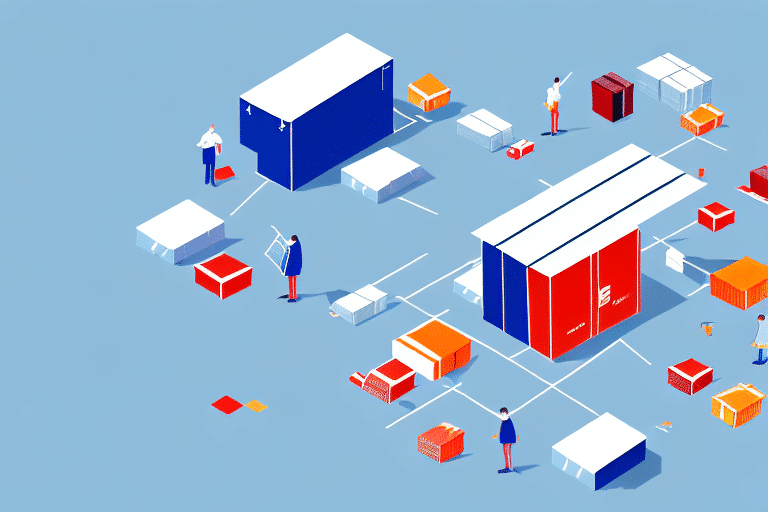3PLs: An Essential Partner in the Growth Stage of Ecommerce
As ecommerce continues to grow, so does the demand for a reliable supply chain. According to Global News Wire, the global 3PL market is projected to reach a value of $1.9 trillion by 2027, with ecommerce being a major driver of growth. In this article, we will explore the key role that 3PLs play in supporting ecommerce businesses during the growth stage.
Understanding 3PLs and Their Role in Ecommerce Growth
Third-party logistics (3PL) providers specialize in warehousing, transportation, and fulfillment services for businesses. In the context of ecommerce, an effective 3PL partner can handle everything from inventory management and order processing to shipping and returns management. This enables businesses to focus on core competencies like product development and marketing, leaving the logistics to the experts.
One of the key benefits of 3PLs for ecommerce businesses is the ability to scale operations rapidly. As demand for products increases, 3PLs can expand their capabilities to meet the needs of their clients. This means businesses can handle high order volumes without the added costs and complications of scaling their own operations. In addition, 3PLs can provide operational flexibility, allowing businesses to adjust their inventory levels and warehousing needs as demand fluctuates.
Another advantage of partnering with a 3PL provider is access to advanced technology and analytics. 3PLs invest heavily in technology to optimize their operations and provide real-time visibility into inventory levels, order status, and shipping information. This allows businesses to make data-driven decisions and improve their overall supply chain efficiency. Additionally, 3PLs can offer customized solutions based on a business's unique needs, such as same-day delivery or specialized packaging options.
Benefits of Partnering with a 3PL for Ecommerce Businesses
Cost Savings
Aside from the ability to scale operations, there are several other benefits to partnering with a 3PL in ecommerce. One of the most important is cost savings. By outsourcing logistics to a 3PL, businesses can avoid the high costs associated with operating their own warehouses and fleets. This can include expenses like real estate, salaries, insurance, and equipment. In addition, 3PLs may be able to negotiate bulk discounts with shipping carriers and pass those savings on to their clients.
Improved Efficiency
Another benefit of 3PL partnerships is improved efficiency. Since 3PLs specialize in logistics, they have the expertise and resources to optimize processes and reduce inefficiencies. This can result in faster order fulfillment times, improved inventory accuracy, and lower shipping costs. Additionally, working with a 3PL can improve customer service by providing faster and more reliable shipping options, as well as streamlined returns and exchanges.
Access to Advanced Technology
Moreover, partnering with a 3PL can also provide businesses with access to advanced technology and software. 3PLs often invest in state-of-the-art systems for inventory management, order tracking, and data analytics. By leveraging these tools, ecommerce businesses can gain valuable insights into their operations and make data-driven decisions to improve efficiency and profitability. Additionally, 3PLs can integrate with a business's existing ecommerce platform, providing a seamless experience for customers and reducing the risk of errors or delays in order processing.
How 3PLs Can Help Ecommerce Businesses Scale Operations
In addition to providing cost savings and operational efficiency, 3PLs can also help ecommerce businesses scale rapidly. This is particularly important during growth phases, when businesses may be experiencing sudden spikes in demand. 3PLs can quickly expand their distribution networks and infrastructure to accommodate increased order volumes, reducing the risk of stockouts and lost sales. Additionally, 3PLs can provide value-added services like kitting and assembly, enabling businesses to offer more complex products without the added complexity.
Another way that 3PLs can help ecommerce businesses scale operations is by providing access to advanced technology and analytics. Many 3PLs have invested in state-of-the-art warehouse management systems, transportation management systems, and other tools that can help businesses optimize their supply chain operations. By leveraging these technologies, businesses can gain greater visibility into their inventory levels, shipping times, and other key metrics, allowing them to make more informed decisions and improve their overall performance.
Finally, 3PLs can also help ecommerce businesses expand into new markets and geographies. By partnering with a 3PL that has a strong presence in a particular region or country, businesses can more easily navigate local regulations, customs, and other challenges. This can be particularly valuable for businesses that are looking to expand internationally, as 3PLs can provide the expertise and infrastructure needed to successfully enter new markets.
Key Considerations When Choosing a 3PL for Ecommerce Fulfillment
Choosing the right 3PL partner is critical to the success of any ecommerce business. There are several key considerations to keep in mind when evaluating potential partners:
- Experience and expertise in ecommerce fulfillment
- Location and size of fulfillment centers
- Technology and software capabilities
- Cost and pricing structure
- Flexibility and scalability
- Service level agreements and guarantees
It's important to thoroughly evaluate potential partners based on these factors and choose a partner that aligns with your business goals and values.
Another important factor to consider when choosing a 3PL partner for ecommerce fulfillment is their customer service. You want to work with a partner that is responsive and easy to communicate with, especially when issues arise. Look for a partner that offers dedicated account managers and has a reputation for excellent customer service.
Additionally, it's important to consider the 3PL's sustainability practices. As consumers become more environmentally conscious, they are increasingly looking for businesses that prioritize sustainability. Choosing a 3PL partner that has sustainable practices, such as using eco-friendly packaging materials or implementing energy-efficient processes, can help improve your brand's reputation and appeal to environmentally conscious consumers.
Tips for Optimizing Your Ecommerce Supply Chain with a 3PL Partner
Once you've chosen a 3PL partner, there are several steps you can take to optimize your supply chain and maximize the benefits of the partnership:
- Improve inventory accuracy through regular audits and cycle counts
- Use data analysis to identify trends and adjust inventory levels accordingly
- Implement a robust returns and exchanges process to improve customer satisfaction
- Collaborate closely with your 3PL partner to identify areas for improvement and optimization
By working closely with your 3PL partner and continuously evaluating and optimizing your supply chain, you can achieve greater efficiency, lower costs, and better customer service.
Another important step in optimizing your ecommerce supply chain with a 3PL partner is to establish clear communication channels and expectations. This includes setting up regular meetings or check-ins to discuss performance metrics, addressing any issues or concerns promptly, and ensuring that both parties are aligned on goals and objectives. Additionally, it's important to regularly review and update your contract with your 3PL partner to ensure that it reflects any changes in your business needs or industry trends.
Case Studies: Successful Ecommerce Businesses that Partnered with 3PLs
To illustrate the benefits of 3PL partnerships in ecommerce, let's look at a few case studies:
- Warby Parker: The online eyewear retailer uses a 3PL to handle its ecommerce fulfillment. By outsourcing logistics, Warby Parker has been able to scale rapidly and expand its product offerings. The partnership has also resulted in faster shipping times and improved order accuracy. Source
- Movember: The charity organization partners with a 3PL to handle merchandise fulfillment during its annual fundraising campaign. The 3PL provides kitting and assembly services, as well as shipping and returns management. By outsourcing logistics, Movember is able to focus on its core mission of raising awareness for men's health issues. Source
- Harry's: The men's grooming products retailer uses a 3PL for warehousing and fulfillment. The partnership has enabled Harry's to offer faster and more reliable shipping options, as well as provide personalized packaging and inserts. The 3PL also provides scalable warehousing solutions, allowing Harry's to handle seasonal spikes in demand. Source
In addition to these case studies, there are many other successful ecommerce businesses that have partnered with 3PLs. For example, Amazon, the world's largest online retailer, uses 3PLs to handle a significant portion of its fulfillment operations. By outsourcing logistics, Amazon is able to focus on its core competencies of technology and customer service, while relying on 3PLs to handle the physical aspects of order fulfillment.
Another example is Shopify, a leading ecommerce platform that enables businesses to create and manage their own online stores. Shopify offers a built-in integration with a number of 3PLs, allowing merchants to easily outsource their fulfillment operations. This has enabled many small and medium-sized businesses to compete with larger retailers by offering fast and reliable shipping options. Source
Trends in the 3PL Industry and What It Means for Ecommerce Growth
The 3PL industry is constantly evolving, with new technologies and trends emerging all the time. One of the biggest trends in recent years has been the rise of automation and robotics in warehousing and fulfillment. 3PLs are increasingly using automated systems to improve efficiency and reduce costs. This trend is particularly relevant to ecommerce businesses, as it can enable faster and more accurate order fulfillment. Source
Another trend in the 3PL industry is the focus on sustainability. Both consumers and businesses are increasingly concerned about the environmental impact of ecommerce. 3PLs are responding by implementing sustainable practices like carbon-neutral shipping and renewable energy sources. Source
One more trend that is gaining momentum in the 3PL industry is the use of big data and analytics. With the help of advanced analytics tools, 3PLs are able to collect and analyze vast amounts of data related to inventory, shipping, and customer behavior. This data can be used to optimize supply chain operations, improve customer service, and identify new business opportunities. Source
Another area of focus for 3PLs is the development of omnichannel fulfillment capabilities. With the rise of ecommerce, customers are increasingly expecting a seamless shopping experience across multiple channels, including online, mobile, and in-store. 3PLs are investing in technology and infrastructure to enable retailers to offer a consistent and convenient shopping experience, regardless of how customers choose to shop.
The Future of 3PLs and Their Impact on the Ecommerce Industry
Looking ahead, it's clear that 3PLs will continue to play a critical role in the growth and success of the ecommerce industry. As ecommerce continues to expand, the demand for reliable and cost-effective logistics solutions will only increase. 3PLs will need to adapt to changing market conditions and adopt new technologies to stay ahead of the competition. This includes further integration of AI and machine learning for predictive analytics, enhanced automation in warehouses, and more sustainable practices to meet environmental standards.
How to Evaluate the ROI of Working with a 3PL Partner in Ecommerce
Finally, it's important to evaluate the return on investment (ROI) of working with a 3PL partner. This requires a comprehensive analysis of costs and benefits, taking into account factors like inventory holding costs, order fulfillment costs, and shipping costs. By comparing these costs to the fees charged by a 3PL partner, businesses can determine whether outsourcing logistics makes financial sense. Additionally, consider the indirect benefits such as improved customer satisfaction, increased scalability, and the ability to enter new markets.
Conclusion
3PLs are an essential partner for ecommerce businesses during the growth stage. By providing cost savings, operational efficiency, and scalability, 3PLs enable businesses to focus on core competencies and expand rapidly. When choosing a 3PL partner, it's important to consider factors like experience, technology, and costs. By optimizing your supply chain with your 3PL partner, you can achieve greater efficiency and customer satisfaction. As the ecommerce industry continues to evolve, 3PLs will play an increasingly important role in enabling businesses to succeed in a competitive market.






















